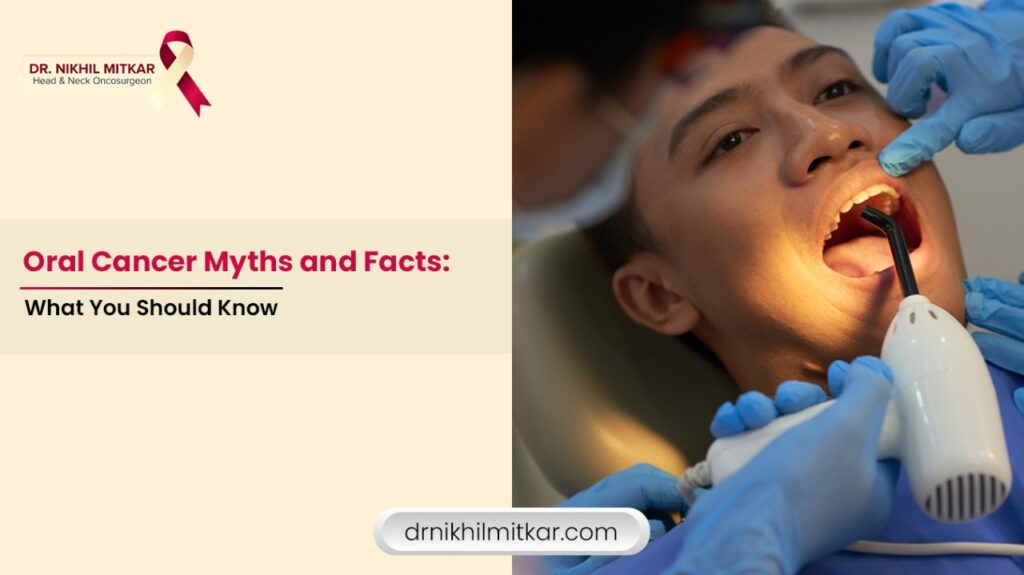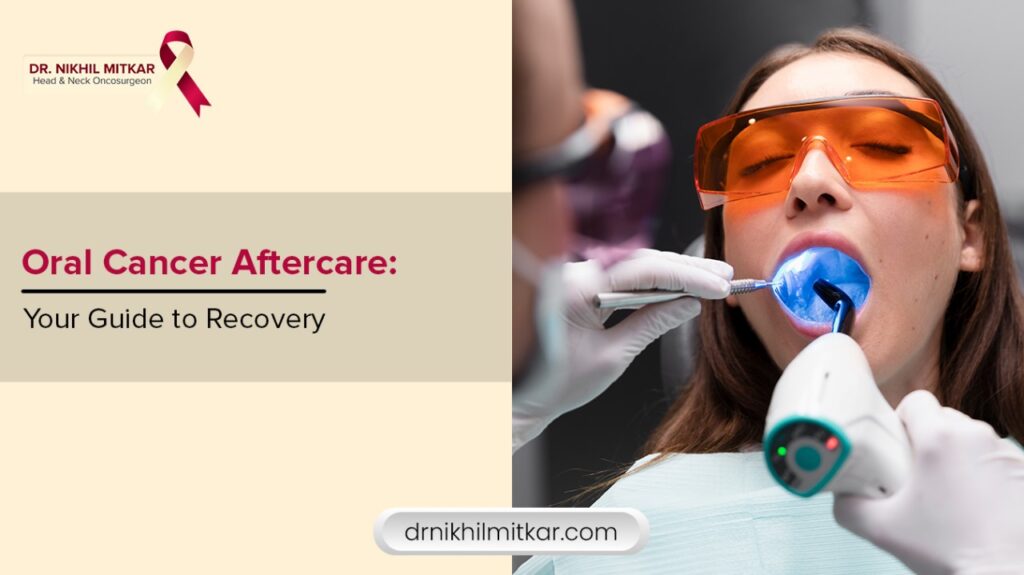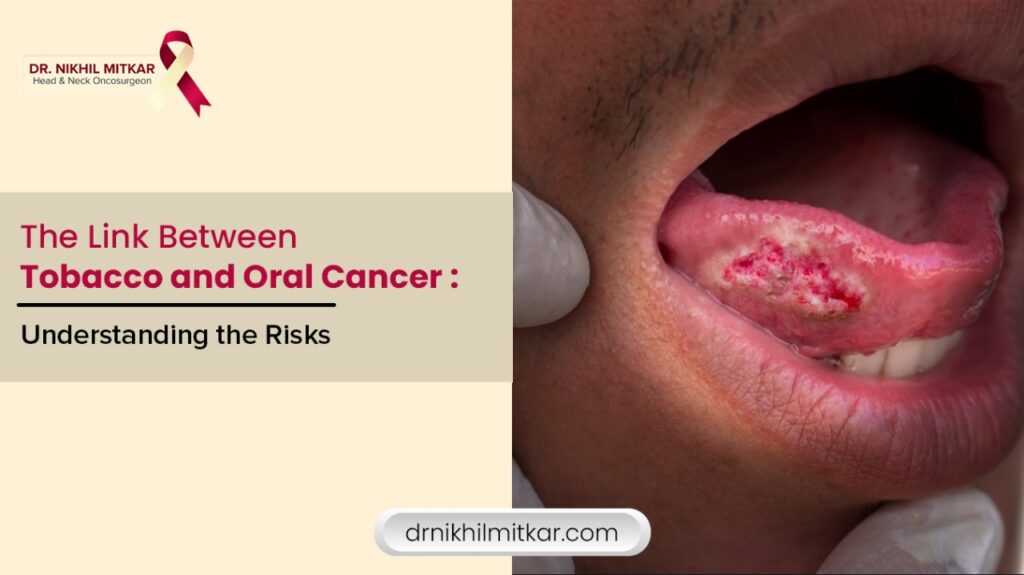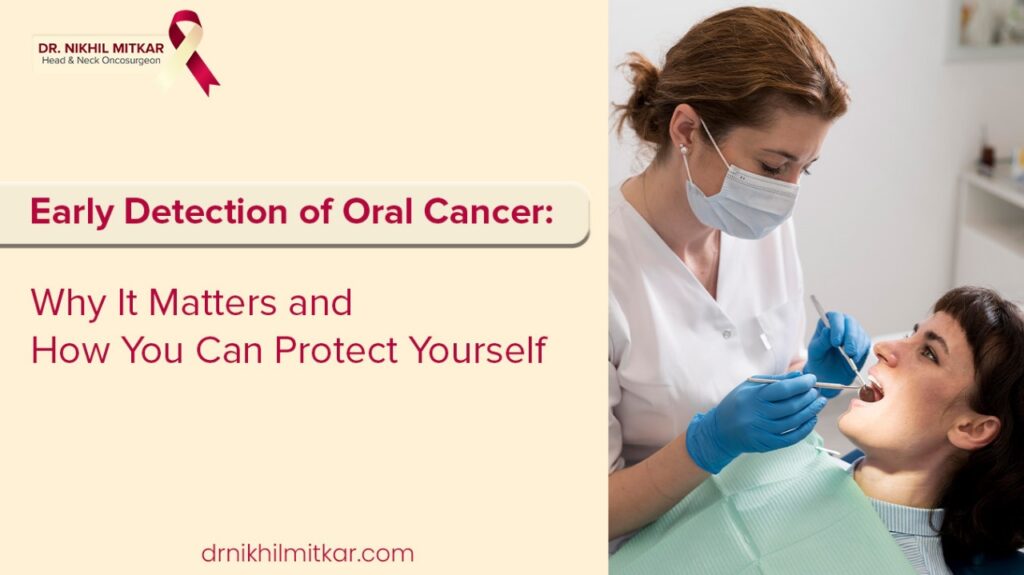Oral Cancer Myths and Facts: What You Should Know

Oral cancer is a serious health issue, yet many people don’t know the facts. Myths and misunderstandings can lead to unnecessary fears or even delays in getting help. Dr. Nikhil Mitkar, a cancer surgeon specializing in head and neck cancer, shares some common myths and the truth behind them to help everyone stay informed
Oral Cancer Aftercare: Your Guide to Recovery

Recovering from oral cancer treatment is a journey that requires time, patience, and proper care. After the completion of surgery, radiation, or chemotherapy, your body needs to heal. This period is crucial for getting back to your daily life while ensuring that the cancer doesn’t return. Here’s a simple guide to help you through the aftercare process and promote a smooth recovery.
The Link Between Tobacco and Oral Cancer: Understanding the Risks

Tobacco use is one of the most significant and preventable causes of cancer worldwide. While many associate tobacco with lung cancer, its devastating effects are far-reaching, contributing to the development of several other cancers, including oral cancer.
Early Detection of Oral Cancer: Why It Matters and How You Can Protect Yourself

Home Blogs Oral Cancer Early Detection of Oral Cancer: Why It Matters and How You Can Protect Yourself Request An Appointment Schedule A Consultation Book Your Consultation Our team is here to give you specialized care and encouragement that will suit your needs Contact Form Demo NameE-mail AddressPhone NumberSubmit Oral cancer is a dangerous disease that can affect any part of the mouth, including the lips, tongue, gums, and inner cheeks. Like many cancers, oral cancer can be treated more effectively if it’s caught early. Unfortunately, many people aren’t aware of the early signs and risk factors, which means the disease often isn’t discovered until it’s more advanced and harder to treat. This blog aims to shed light on why early detection of oral cancer is so crucial, the symptoms you should watch out for, and how to reduce your risk. Understanding Oral Cancer Oral cancer refers to cancer that starts in the mouth or throat. The most common type is squamous cell carcinoma, which develops in the flat, thin cells that line the inside of the mouth. Oral cancer can spread quickly if not treated early, but with early detection, the chances of survival are much higher. According to the Oral Cancer Foundation, oral cancer kills one person every hour, every day in the U.S. This is because many people don’t recognize the signs until the cancer is in its later stages. With proper awareness and regular screenings, we can change that statistic. Why Early Detection is Crucial When oral cancer is detected early, patients have an 80-90% chance of successful treatment. In contrast, if the cancer is diagnosed at a more advanced stage, the survival rate drops significantly. Early detection allows for less invasive treatment options, better outcomes, and a higher quality of life post-treatment. The key to early detection is knowing what to look for and understanding your personal risk factors. Regular dental check-ups are also essential because your dentist is trained to spot early signs of oral cancer during routine exams. Risk Factors for Oral Cancer Certain behaviors and conditions increase the likelihood of developing oral cancer. These risk factors include: Tobacco Use: Smoking cigarettes, cigars, or pipes, as well as using chewing tobacco, are the leading causes of oral cancer. Alcohol Consumption:Heavy alcohol use significantly increases the risk, especially when combined with tobacco use. Human Papillomavirus (HPV):HPV, particularly the HPV-16 strain, has been linked to cancers in the mouth and throat. Excessive Sun Exposure:Prolonged exposure to the sun without protection can raise the risk of cancer on the lips. Age and Gender: Oral cancer is more common in men over the age of 45. Dietary Deficiencies:Not consuming enough fruits and vegetables, which are rich in antioxidants, can increase the risk. Family History: A family history of oral or other cancer types can elevate your risk. Understanding these risk factors allows you to make lifestyle changes to lower your chances of developing oral cancer. Recognizing the Symptoms of Oral Cancer Many symptoms of oral cancer can be mistaken for less serious conditions, like a sore that won’t heal or a common mouth ulcer. However, if you experience these symptoms for more than two weeks, it’s important to seek medical advice immediately. Common signs of oral cancer include: Sores or Ulcers That Don’t Heal:Any sore in your mouth that doesn’t heal within two weeks should be checked. Lumps or Growths:If you notice any lumps or thickened areas in your mouth or throat, see a doctor. White or Red Patches:Unexplained white or red patches in the mouth or on the tongue may be a sign of cancer. Difficulty Swallowing:Persistent difficulty swallowing or feeling like something is stuck in your throat can be a symptom. Mouth Pain or Numbness: If you experience pain, tenderness, or numbness in the mouth or lips that lasts for an extended period, it’s time to see a specialist. Changes in Speech or Voice:A hoarse voice or difficulty speaking could indicate cancer in the mouth or throat. Loose Teeth: If your teeth start becoming loose for no obvious reason, it could be a sign of cancer in the jaw or gums. Swelling or Pain in the Jaw: Pain or difficulty moving the jaw is another symptom that shouldn’t be ignored. It’s important to note that many of these symptoms can also be caused by non-cancerous conditions, but it’s always best to get them checked by a healthcare provider. How Oral Cancer is Diagnosed The first step in diagnosing oral cancer is a thorough examination by your dentist or doctor. They will look for any abnormal growths, sores, or patches in your mouth. If they find something suspicious, they may recommend the following diagnostic procedures: Biopsy: A small sample of tissue is taken from the suspicious area and examined for cancerous cells. Imaging Tests: X-rays, CT scans, or MRIs may be used to determine if the cancer has spread to other areas. Endoscopy: In some cases, a thin, flexible tube with a camera (endoscope) is used to examine the inside of the mouth and throat. Early-stage oral cancer can often be treated with surgery alone, while more advanced stages may require a combination of surgery, radiation, and chemotherapy. Prevention of Oral Cancer While not all cases of oral cancer can be prevented, there are steps you can take to reduce your risk. These include: Quit Tobacco: Whether you smoke or chew tobacco, quitting is one of the best things you can do for your overall health and to lower your cancer risk. Limit Alcohol Consumption: If you drink alcohol, do so in moderation. The combination of alcohol and tobacco is especially dangerous. Eat a Healthy Diet: A diet rich in fruits and vegetables can help protect your cells from cancer. These foods are full of antioxidants, which help prevent cell damage. Protect Yourself from HPV:Consider getting vaccinated against HPV, especially if you are under 45. Use Sunscreen on Your Lips: Just like your skin, your lips can be damaged by the sun. Use a lip